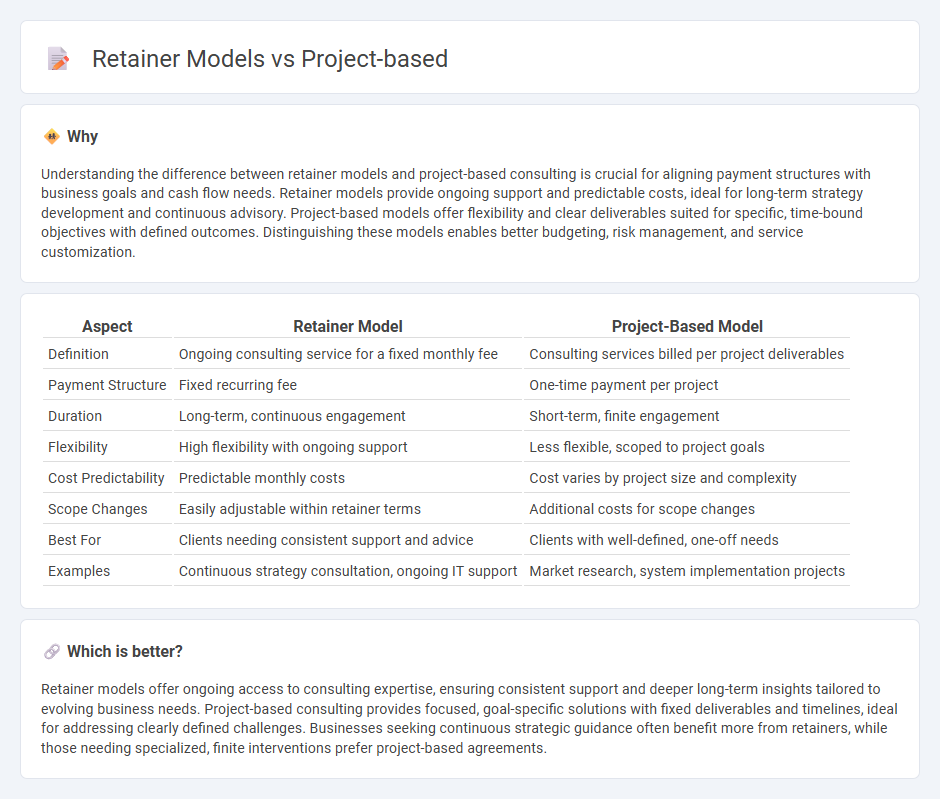
Consulting retainer models offer continuous access to expert advice and strategic support, ensuring ongoing alignment with business goals, while project-based consulting focuses on specific deliverables within a defined timeline. Retainer engagements provide predictable budgeting and greater flexibility to address evolving challenges, contrasting with the one-off nature and fixed costs of project-based contracts. Explore the benefits of each consulting model to determine the best fit for your organization's needs.
Why it is important
Understanding the difference between retainer models and project-based consulting is crucial for aligning payment structures with business goals and cash flow needs. Retainer models provide ongoing support and predictable costs, ideal for long-term strategy development and continuous advisory. Project-based models offer flexibility and clear deliverables suited for specific, time-bound objectives with defined outcomes. Distinguishing these models enables better budgeting, risk management, and service customization.
Comparison Table
| Aspect | Retainer Model | Project-Based Model |
|---|---|---|
| Definition | Ongoing consulting service for a fixed monthly fee | Consulting services billed per project deliverables |
| Payment Structure | Fixed recurring fee | One-time payment per project |
| Duration | Long-term, continuous engagement | Short-term, finite engagement |
| Flexibility | High flexibility with ongoing support | Less flexible, scoped to project goals |
| Cost Predictability | Predictable monthly costs | Cost varies by project size and complexity |
| Scope Changes | Easily adjustable within retainer terms | Additional costs for scope changes |
| Best For | Clients needing consistent support and advice | Clients with well-defined, one-off needs |
| Examples | Continuous strategy consultation, ongoing IT support | Market research, system implementation projects |
Which is better?
Retainer models offer ongoing access to consulting expertise, ensuring consistent support and deeper long-term insights tailored to evolving business needs. Project-based consulting provides focused, goal-specific solutions with fixed deliverables and timelines, ideal for addressing clearly defined challenges. Businesses seeking continuous strategic guidance often benefit more from retainers, while those needing specialized, finite interventions prefer project-based agreements.
Connection
Consulting retainer models provide ongoing access to expert advice, ensuring continuous support and proactive problem-solving, while project-based engagements focus on specific deliverables within a defined timeframe. Both models complement each other by balancing long-term strategic guidance with targeted, goal-oriented execution. Firms often blend retainer and project-based structures to optimize resource allocation and address evolving client needs effectively.
Key Terms
Scope of Work
Project-based models define a fixed Scope of Work with specific deliverables, timelines, and objectives, enabling clear project boundaries and controlled costs. Retainer models offer ongoing support with flexible Scope of Work, adapting to evolving client needs and prioritizing continuous collaboration over discrete tasks. Discover detailed comparisons between project-based and retainer models for optimal Scope of Work strategies.
Billing Structure
Project-based billing structure involves charging clients a fixed fee for the completion of a specific project, making costs predictable and scope well-defined. Retainer models require clients to pay a recurring fee, often monthly, providing ongoing access to services and fostering long-term collaboration. Explore the advantages and use cases of each billing structure to determine the best fit for your business needs.
Client Relationship
Project-based models emphasize defined deliverables and fixed timelines, often resulting in transactional client interactions. Retainer models foster ongoing collaboration, enhancing trust and continuous value delivery through long-term engagement. Explore how each model can strategically shape your client relationships for sustained business growth.
Source and External Links
What is Project-Based Learning (PBL)? - Project-based learning is a learner-centered, inquiry-based approach where students actively construct knowledge through real-world projects, fostering critical thinking, collaboration, and student agency.
Project-based learning - PBL integrates knowing and doing by engaging students in solving authentic problems and creating meaningful products, shifting education focus from curriculum to student experience and skills like creativity and resilience.
Project-based Learning, Explained - PBL is active learning where students gain knowledge and confidence by developing practical solutions to open-ended real-world problems, guided by instructors who facilitate rather than direct learning.
 dowidth.com
dowidth.com